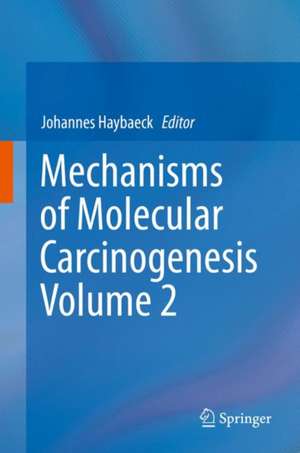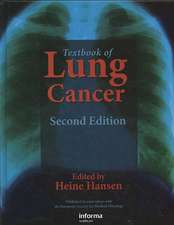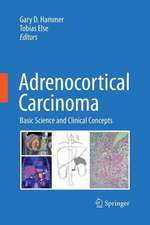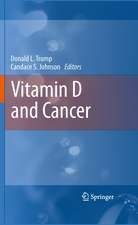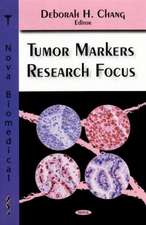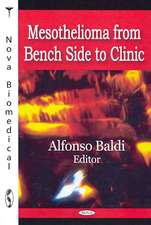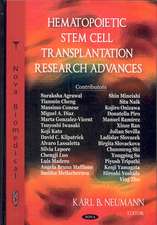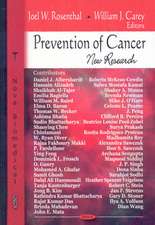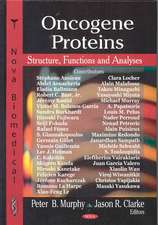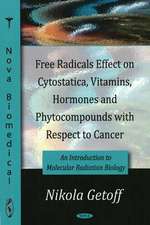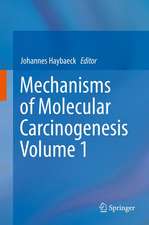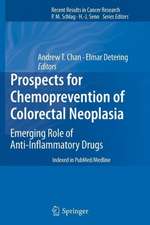Mechanisms of Molecular Carcinogenesis – Volume 2
Editat de Johannes Haybaecken Limba Engleză Hardback – 5 iun 2017
Together with Volume 1, this book provides an inclusive overview of the molecular and cellular mechanisms of carcinogenesis and offers comprehensive insights into related clinical and therapeutic aspects.
This second volume complements the first by presenting and concisely explaining the carcinogenesis of various tumor entities such as non-melanoma skin cancers, bone and soft tissue tumors, pancreatic cancers, hepatocellular cancer and neuroendocrine tumors. As in volume one, each chapter illuminates the similarities and dissimilarities of changed signaling pathways in the different organ systems and depicts potential therapeutic strategies. The focus of volume two lies on the presentation of modern molecular biological techniques for diagnosis, as well as strategies for biomarker identification and validation. Furthermore, it discusses potential therapeutic targets and individualized treatment strategies, offering a valuable resource for all basic scientists and medical researchers interested in translational cancer research.
This second volume complements the first by presenting and concisely explaining the carcinogenesis of various tumor entities such as non-melanoma skin cancers, bone and soft tissue tumors, pancreatic cancers, hepatocellular cancer and neuroendocrine tumors. As in volume one, each chapter illuminates the similarities and dissimilarities of changed signaling pathways in the different organ systems and depicts potential therapeutic strategies. The focus of volume two lies on the presentation of modern molecular biological techniques for diagnosis, as well as strategies for biomarker identification and validation. Furthermore, it discusses potential therapeutic targets and individualized treatment strategies, offering a valuable resource for all basic scientists and medical researchers interested in translational cancer research.
| Toate formatele și edițiile | Preț | Express |
|---|---|---|
| Paperback (1) | 988.91 lei 38-44 zile | |
| Springer International Publishing – 11 iun 2018 | 988.91 lei 38-44 zile | |
| Hardback (1) | 1007.77 lei 38-44 zile | |
| Springer International Publishing – 5 iun 2017 | 1007.77 lei 38-44 zile |
Preț: 1007.77 lei
Preț vechi: 1060.80 lei
-5% Nou
Puncte Express: 1512
Preț estimativ în valută:
192.86€ • 197.51$ • 160.43£
192.86€ • 197.51$ • 160.43£
Carte tipărită la comandă
Livrare economică 14-20 martie
Preluare comenzi: 021 569.72.76
Specificații
ISBN-13: 9783319536606
ISBN-10: 3319536605
Pagini: 430
Ilustrații: VIII, 374 p. 47 illus., 42 illus. in color.
Dimensiuni: 155 x 235 mm
Greutate: 0.79 kg
Ediția:1st ed. 2017
Editura: Springer International Publishing
Colecția Springer
Locul publicării:Cham, Switzerland
ISBN-10: 3319536605
Pagini: 430
Ilustrații: VIII, 374 p. 47 illus., 42 illus. in color.
Dimensiuni: 155 x 235 mm
Greutate: 0.79 kg
Ediția:1st ed. 2017
Editura: Springer International Publishing
Colecția Springer
Locul publicării:Cham, Switzerland
Cuprins
1. Breast Carcinogenesis.- 2. Non-melanoma skin cancer, Actinic keratosis and squamous cell cancer.- 3. Molecular Pathogenesis of Soft Tissue Tumours.- 4. Colorectal carcinogenesis.- 5. Pancreatic Carcinogenesis.- 6. Hepatocellular carcinogenesis.- 7. Neuroendocrine tumorigenesis.- 8. Molecular etiopathogenesis of extranodal marginal zone B cell lymphoma of mucosa associated lymphoid tissue.- 9. Urologic neoplasms including Kidney and Urinary Bladder.- 10. Molecular Carcinogenesis of Urinary Bladder Cancer.- 11. Gynecologic Carcinogenesis.- 12. CTCs and ctDNA.- 13. Computational Pathology.- 14. In vitro three-dimensional cultures as tool for personalized medicine.- 15. Stratifying cancer therapies by molecular interactions and imaging.- 16. Molecular Modelling
Notă biografică
Prof. Johannes Haybaeck is a professor of Pathology at the Department of Pathology, Medical Faculty of the University of Magdeburg, Germany. He is a board certified pathologist and neuropathologist who is also specialized in molecular biology. Prof. Haybaeck received his first degree in Medicine at Innsbruck University, Austria, prior to further studies at the University of Zurich, Innsbruck and Salzburg. He received his PhD degree at the Mathematical and Natural Science Faculty of the University of Zurich. Since 2010, he has led his own research group and has been a consultant for pathology and neuropathology. In 2011, he was nominated as Vice Chair, and since 2014, he has held the title of Chairman of the Department of Neuropathology at the Medical University of Graz, Austria. He was elected as Founding Coordinator for Cancer Research, Education and Training of the Comprehensive Cancer Center (CCC) Graz for two periods. In 2016, he was nominated as Full Professor and Head of the Department of Pathology at Magdeburg University Hospital in Germany. In his capacity as a surgical pathologist and neuropathologist, he is confronted with diagnostic questions on a daily basis. Accordingly, his research focuses on the cellular and molecular mechanisms driving carcinogenesis. Together with his coworkers in Magdeburg and Graz, he is constantly engaged in the development of novel models mimicking the human situation in order to establish prognostic and predictive biomarkers and to generate novel therapies.
Textul de pe ultima copertă
Together with Volume 1, this book provides an inclusive overview of the molecular and cellular mechanisms of carcinogenesis and offers comprehensive insights into related clinical and therapeutic aspects.
This second volume complements the first by presenting and concisely explaining the carcinogenesis of various tumor entities such as non-melanoma skin cancers, bone and soft tissue tumors, pancreatic cancers, hepatocellular cancer and neuroendocrine tumors. As in volume one, each chapter illuminates the similarities and dissimilarities of changed signaling pathways in the different organ systems and depicts potential therapeutic strategies. The focus of volume two lies on the presentation of modern molecular biological techniques for diagnosis, as well as strategies for biomarker identification and validation. Furthermore, it discusses potential therapeutic targets and individualized treatment strategies, offering a valuable resource for all basic scientists and medical researchers interested in translational cancer research.
Caracteristici
Offers a broad and concise understanding on various tumor entities
Volume 2 presents novel strategies for biomarker identification
Describes emerging diagonstic techniques
Discusses individualized treatment strategies
Volume 2 presents novel strategies for biomarker identification
Describes emerging diagonstic techniques
Discusses individualized treatment strategies
